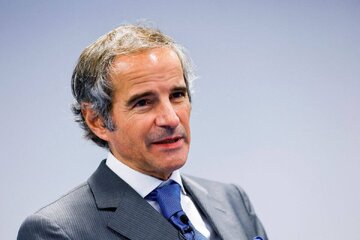Speaking at a press conference before the IAEA's Board of Governors in Vienna on Monday, Rafael Grossi called on Iran to seriously cooperate with the Agency in accordance with the Joint Statement signed in Tehran on 4 March.
Grossi said that there is no link between Iran and the IAEA cooperation and the recent indirect talks between Iran and the United States and the prisoner swap between them, saying that he only cares about the nuclear issue with Iran.
He pointed to the recent IAEA report on Iran's nuclear program, claiming that there has not been "much progress" in relations between Tehran and the IAEA on the outstanding issues.
The IAEA chief said that Iran and the IAEA joint statement was supposed to be "a gradual process of confidence-building", adding that the joint statement was supposed to increase Agency's presence in Iran electronically (CCTV cameras) and otherwise.
He added that the issue of the recorded data by the cameras in Iran was supposed to be tackled.
The nuclear chief further said that Iran and the IAEA have to reach an agreement on access to the recorded date and information of the cameras in Iran, while also noting that the two sides are nowhere near that agreement for the time being.
In response to a question about the reports on the lack of a resolution against Iran despite alleged IAEA disappointment in its latest report on Iran nuclear program, Grossi said that the issue of resolution is in the realm of the member states of the agency, refusing to say that "if a resolution is good or bad."
The IAEA chief also touched upon Iran's nuclear program issue in his Introductory Statement to the Board of Governors where he said that, "As you are aware, the Agency’s JCPOA-related verification and monitoring has been seriously affected by Iran’s decision in February 2021 to stop implementing altogether its nuclear-related commitments under the JCPOA. The situation was exacerbated by Iran’s subsequent decision to remove all the Agency’s JCPOA-related surveillance and monitoring equipment."
"It has been more than two and a half years since Iran stopped provisionally applying its Additional Protocol and, therefore, since it provided updated declarations, and since the Agency was able to conduct complementary access to sites and other locations in Iran," he added.
Grossi also said that "You also have before you my report on NPT Safeguards Agreement with the Islamic Republic of Iran. I regret that no further progress has been made in implementing the activities set out in the Joint Statement signed in Tehran on 4 March."
He went in to stress that, "Iran also still needs to provide the Agency with technically credible explanations for the presence of uranium particles of anthropogenic origin at Varamin and Turquzabad and inform the Agency of the current location(s) of related nuclear material and/or of contaminated equipment. It also still needs to resolve the discrepancy in the nuclear material balance evaluation relating to the Uranium Conversion Facility (UCF) and to implement modified Code 3.1."
"These outstanding safeguards issues stem from Iran’s obligations under its Comprehensive Safeguards Agreement and need to be resolved for the Agency to be in a position to provide assurance that Iran’s nuclear program is exclusively peaceful," he added.
Grossi further called upon Iran "to work with the Agency in earnest and in a sustained way towards the fulfilment of the commitments contained in the Joint Statement."
Iran took some steps away from the 2015 nuclear deal known as the JCPOA after the illegal unilateral US withdrawal from the deal and the continued E3 participants' indifference to the illegal US sanction on Iran. Tehran has vowed that it will reverse course and will fully abide by the deal when the Western parties remove all the sanctions against it in accordance with the text of the JCPOA.
Iran and the other parties to the nuclear deal were very close to concluding an agreement in September 2022 to revive the deal after the removal of sanctions on Tehran. However, as the Iranian foreign minister said recently in an interview, the United States and the three European parties to the JCPOA pulled back from the agreed draft agreement after pinning hope on last year's riots in Iran which they thought they could topple the Iranian government.


Your Comment